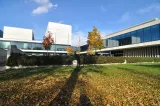10th International Conference Solid State Chemistry, June 10 - 14
Since its founding in 1950, the Faculty has become a renowned institution of higher education in a variety of chemistry related areas. At present, the Faculty provides courses leading to Bachelor, Master and Doctoral degrees.
The backbone of the study programme is represented by the two-level five-year Master degree course in Chemistry and Technical Chemistry. The students of the first level cover the basic areas of technical chemistry such as general, inorganic, organic and analytical chemistry; mathematics; physics; physical chemistry; computing; chemical engineering supplemented by the study of toxicology; ecology; and technically oriented foreign language training. The follow-up course extends the first level and students knowledge. The students can also participate in a scientific research at the Faculty departments or gain the first experience in the leading companies in the country or abroad. The offered specialisations are: Inorganic and Bioinorganic Chemistry, Inorganic Technology, Chemical Technology of Paper and Pulp, Chemical Engineering, Material Engineering, Environment Protection, Organic Chemistry, Economics and Management of Chemistry and Foodstuff Industries, Process Control, Technical Physica
l and Analytical Chemistry, Technology of Organic Specialities, Technology of Polymers Manufacturing and Processing, Theory and Technology of Explosives, Fibres and Textile Chemistry, Environmental Engineering. The second level is concluded by the defence of the diploma thesis and the Final State Examination leading to the Master degree (Ing.).
Another five-year course in Chemistry and Technology of Foodstuffs offers the study specialisation in Evaluation and Analysis of Foodstuffs. Beside the subjects of technical chemistry and language training, the first study level comprises general and foodstuffs microbiology, biochemistry, and the basis of food-processing technologies. The advanced programme offers subjects such as food analysis and enables the students to become acquainted with the standard methods of food assessment, trace analysis of the food chain using modern instrumental methods, and computing.
Master study course in the Special Chemical and Biological Programmes consists in the first study level of the specialisation in Clinical Biology and Chemistry. The course comprises - besides the chemistry-oriented subjects and mathematics - biostatistics, physics, computing, general and clinical biochemistry, general biology, physiology, general microbiology, genetics, immunology, toxicology and medical information technology. The course leads to the Bachelor degree (Bc.) and is followed by the second level course in Analysis of Biological Materials extending the students' knowledge of clinical biology and chemistry and leading to the Magistr (Master - Mgr.) degree.
The Faculty as the only one in the Czech Republic offers higher education in the field of Graphic Arts, both in the Bachelor, and Master degree courses. Graduates of the three-year Bachelor programme are knowledgeable in printing techniques and materials, they are able to use computer techniques for pre-printing operations, electronic publishing and multimedia communication. Acquired knowledge can be extended in the follow-up two-year Master course that prepares students for both managing positions in the large companies, and private enterpreneurship, too.
The three-year Bachelor study programme in Chemical and Process Engineering specialising in Chemical Process Control is also taught on the basis of special needs of the chemical industry. The graduates assert themselves as a middle company management and technical workers in plants of chemical, pharmaceutical and food industry. They can also continue their study in some of the two-year Master courses in Chemistry and Technical Chemistry.
After the Master courses, the successful graduates can continue their studies in the three-year postgraduate Doctoral courses leading to the PhD. degree. The Doctoral study programmes, which are closely connected to Chemistry and Technical Chemistry courses, progressively extend the gained knowledge and put a stress on the independent research activities. It is common that a part of the Doctoral studies can be carried out at one of the well-known universities abroad in close co-operation with the Faculty and its research laboratories. The scientific activities of the Faculty aim at both elementary and technological research. The postgraduate Doctoral programmes are consequently focused on the following fields: Inorganic Chemistry, Organic Chemistry, Analytical Chemistry, Physical Chemistry, Inorganic Technology, Organic Technology, Technology of Polymers, Chemistry and Technology of Inorganic Materials, Chemical Engineering, Technical Cybernetics, Economics and Management and Applied and Landscape Ecology.
A number of successful technical projects were completed in co-operation with the industrial sector and a wide range of scientific papers was published and met with an excellent scientific response. The growing reputation of the Faculty is also indicated by many international conferences and congresses held at the University every year. The Joint Laboratory of Solid State Chemistry of the Academy of Sciences of the Czech Republic and the University of Pardubice, the Research Centre of New and Perspective Inorganic Compounds and Materials, as well as the shared laboratories at other research institutions and the Pardubice Hospital also contribute to the high reputation of the Faculty.

